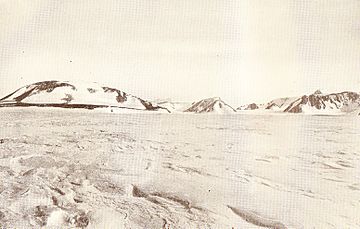Mount Hope (Ross Dependency) facts for kids
Quick facts for kids Mount Hope |
|
|---|---|

Mount Hope, the dome-shaped hill on the left, photographed by Shackleton's party in December 1908
|
|
| Highest point | |
| Elevation | approx. 3,500 feet (1,100 m) |
| Geography | |
|
Lua error in Module:Location_map at line 420: attempt to index field 'wikibase' (a nil value).
|
|
| Location | Antarctica Ross Dependency |
| Parent range | Transantarctic Mountains |
Mount Hope is a special hill in Antarctica. It looks like a dome and stands about 3,500 feet (1,100 meters) tall. This important hill is located near the Beardmore Glacier and the Ross Ice Shelf. It played a key role in the early explorations of the South Pole.
Discovering Mount Hope
Mount Hope was first seen on December 3, 1908. It was discovered by Ernest Shackleton and his team during their Nimrod Expedition. They were on a journey to reach the South Pole.
A Path to the Pole
When Shackleton's team climbed Mount Hope, they saw something amazing. From the top, they could see a huge glacier stretching out. This glacier, later known as the Beardmore Glacier, looked like an open road to the South Pole. Shackleton wrote about how difficult it was to climb the rocky face. But once they reached the top, they saw a clear path ahead.
Shackleton named the hill "Mount Hope" because it gave them great hope for their journey. His team used the glacier to travel further south. However, they had to turn back before reaching the South Pole.
Scott's Journey
Three years later, Captain Scott and his team followed the same path. They also used the Beardmore Glacier to reach the South Pole. Sadly, Captain Scott and his entire team died on their way back from the Pole.
Supporting Explorers
Mount Hope was also important for another expedition. In 1916, it was the place where the Ross Sea party left their last supplies. These supplies were meant to help Shackleton's team. Shackleton had planned to cross Antarctica, but his journey did not happen as planned.
See also
 In Spanish: Monte Hope (Antártida Oriental) para niños
In Spanish: Monte Hope (Antártida Oriental) para niños

